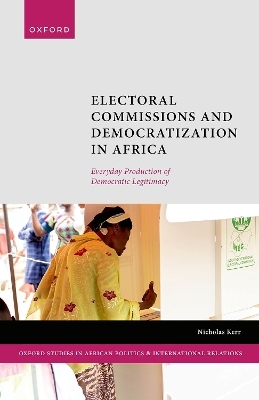
Electoral Commissions and Democratization in Africa
Oxford University Press (Verlag)
978-0-19-889536-7 (ISBN)
Whereas previous research focuses on the institutional design of electoral commissions, this book privileges their actual performance and focuses on two attributes: autonomy and capacity. By serving an informational role, the autonomy and capacity of electoral commissions influences how citizens and elites think about and behave during elections. This includes whether political elites and citizens participate in elections, engage in electoral fraud and violence, accept electoral outcomes, and express confidence in elections. These attitudes and behaviors, in turn, influence whether elections meet democratic standards (election quality) and whether political elites and citizens regard election processes as acceptable (election legitimacy).
This book brings together evidence from public opinion surveys, elite surveys, field research, and cross-national databases to give an unusually rich empirical exploration of the dynamics of elections and democracy in sub-Saharan Africa since the 1990s, with a focused case study of Nigeria. Electoral Commissions and Democratization in Africa will be appealing to scholars and policymakers interested in democratization and elections.
Oxford Studies in African Politics and International Relations is a series for scholars and students working on African politics and International Relations and related disciplines. Volumes concentrate on contemporary developments in African political science, political economy, and International Relations, such as electoral politics, democratization, decentralization, gender and political representation, the political impact of natural resources, the dynamics and consequences of conflict, comparative political thought, and the nature of the continent's engagement with the East and West. Comparative and mixed methods work is particularly encouraged, as is interdisciplinary research and work that considers ethical issues relating to the study of Africa. Case studies are welcomed but should demonstrate the broader theoretical and empirical implications of the study and its wider relevance to contemporary debates. The focus of the series is on sub-Saharan Africa, although proposals that explain how the region engages with North Africa and other parts of the world are of interest.
Series Editors: Nic Cheeseman, Professor of Democracy and International Development, University of Birmingham; Peace Medie, Senior Lecturer in Gender and International Politics, University of Bristol; and Ricardo Soares de Oliveira, Professor of the International Politics of Africa, University of Oxford.
Nicholas Kerr is Assistant Professor of Political Science at the University of Florida. His research interests include comparative institutions, electoral management, electoral integrity, public opinion, and African politics. His work has been published in leading journals including Comparative Politics, Governance, Political Research Quarterly, Political Studies, Political Psychology, and Electoral Studies. Several of these publications have explored themes related to elite and mass trust in elections, as well as the impact electoral commissions on democratization. He holds a Ph.D. in Political Science from Michigan State University and a Bachelor of Arts in Political Science from Williams College.
List of Figures
List of Tables
1: Introduction
Part I Electoral Commissions and African Elections: Theory and Evidence
2: The Informational Role of Electoral Commissions
3: The Institutionalization of Electoral Commissions in Africa and Nigeria Post-1990
Part II Implications for African Political Elites
4: Electoral Commissions and African Elites: Opposition Boycotts and Losers' Consent
5: Electoral Commissions and Nigerian Elites: Election Legitimacy and Losers' Consent
Part III Implications for African Voters
6: Electoral Commissions and African Voters: Election Legitimacy and Turnout
7: Electoral Commissions and Nigerian Voters: Election Day Experiences and the Everyday Legitimacy of Elections
8: Conclusions
Appendix
References
Index
| Erscheinungsdatum | 07.09.2024 |
|---|---|
| Reihe/Serie | Oxford Studies in African Politics and International Relations |
| Verlagsort | Oxford |
| Sprache | englisch |
| Maße | 160 x 240 mm |
| Gewicht | 694 g |
| Themenwelt | Geisteswissenschaften ► Geschichte ► Regional- / Ländergeschichte |
| Sozialwissenschaften ► Politik / Verwaltung ► Politische Systeme | |
| Sozialwissenschaften ► Politik / Verwaltung ► Staat / Verwaltung | |
| ISBN-10 | 0-19-889536-4 / 0198895364 |
| ISBN-13 | 978-0-19-889536-7 / 9780198895367 |
| Zustand | Neuware |
| Haben Sie eine Frage zum Produkt? |
aus dem Bereich


